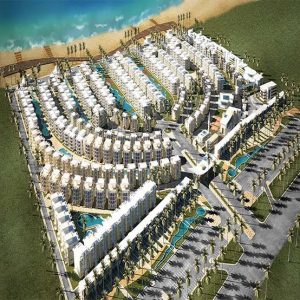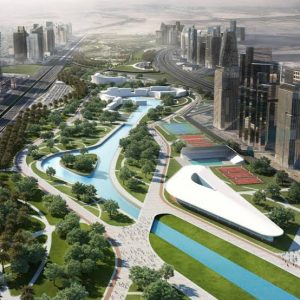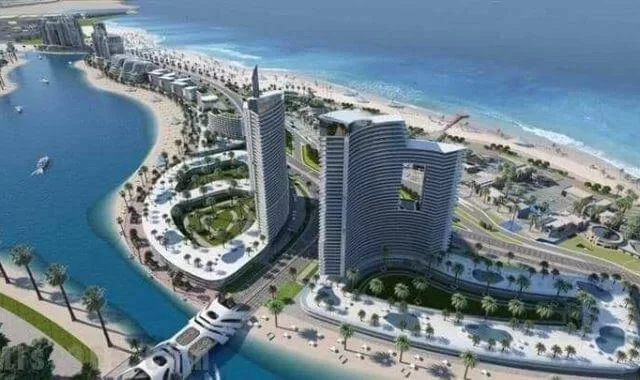These cities were built to ease congestion, create jobs and apply technology and artificial intelligence (AI) for a better quality of life, in line with Egypt’s Vision 2030.
Powered by renewable energy and smart technology, the country’s fourth-generation cities feature the newest architecture, built through sustainable and green infrastructure, and connected through multi-modal transport networks.
Blueprint for change
The blueprint for change is based on dozens of new smart cities currently under construction. “We are a nation of builders and, historically, we have always contributed to the success of humanity,” says Hassan Allam, CEO of Egyptian construction giant Hassan Allam Holding.
NAC salvage of overpopulation in bustling Cairo
Located 45 kilometres east of the bustling Cairo metropolis, a new vision for urban living in the 21st century is taking shape. The New Administration Capital (NAC) sits at the heart of Egypt’s smart cities programme.
As Greater Cairo now houses more than 20 million, the NAC is Egypt’s response to its population growth and the need to create sustainable communities.
Positioned to become the sustainability capital of the Middle East, the NAC has become home to key government ministries and foreign embassies. “The government designed a new city technologically-advanced with state-of-the-art buildings and infrastructure,” says Allam, adding that connectivity, ease of doing business, strategic communications, modern transport systems and renewable energy supplies are priorities.
Ambitious plan to build 24 smart cities, housing 32m people
Prime Minister Moustafa Madbouli has unveiled a major urban development plan for the nation. The ambitious project involves the construction of 24 new ‘fourth generation’ cities, which are expected to house about 32 million people. These smart cities are designed to feature digital solutions and green technology, embodying a vision of modern, sustainable living.
The announcement was made during the Story of a Nation conference last week, a three-day event dedicated to highlighting the government’s achievements over the past decade.

Eco-friendly new cities
The new cities, which include New Mansoura City in the Nile Delta region, New Alamein on the Mediterranean coast, Al Galala City in northeast Egypt, New Luxor and New Aswan City in southern Egypt, are part of a wider strategy to address Egypt’s housing and overpopulation challenges.
Prime Minister Madbouli said the government has already built 1.5 million residential units in both new and existing cities. In addition, living conditions in previously unsafe residential areas have been improved with the construction of 300,000 housing units across 357 areas nationwide.
However, the government’s plans go beyond providing decent housing for citizens. In line with global advancements, the new smart cities are designed to be equipped with smart solutions and environmentally friendly technologies.
Urban development
The urban development initiative represents a significant stride towards a future-ready Egypt. By 2050, the nation plans to expand the number of smart cities to 38. These cities, with their focus on sustainability and digitally enhanced living, represent the next phase of urbanisation, poised to set a benchmark for other nations.
With this initiative, Egypt is not simply addressing its current housing challenges, but also laying the groundwork for a future where urban living is connected with sustainability, smart solutions, and improved quality of life.
The prime minister said in recent remarks that the country’s development experiment over the past nine years has placed it on the world map in several vital sectors, and that Cairo is ready to offer its expertise to any Arab or African state.
Minister of Housing, Utilities and Urban Communities Assem el-Gazzar said, during Story of Homeland conference last week in the presence of President Abdel Fattah El Sisi, that the construction of new cities in Egypt is the largest and most successful experience of its kind worldwide, noting that no country in the world has implemented this number of new city projects in such a short period of time.
The concept of urban development is not only limited to the establishment of new cities and housing, but extends to all aspects of development in various fields, such as agriculture, industry, education and tourism, El-Gazzar said.
He said that the construction of these cities aims to reduce congestion, generate job opportunities, and utilize technology and artificial intelligence (AI) for a better quality of life, in line with Egypt’s Vision 2030.

New Mansura City
An example of the new cities is Mansoura City, one of the cities affiliated to the New Urban Communities Authority.
It was built according to a Republican decree in 2017 to be used to build a new urban community. The city is implemented in four stages on an area of 5913 feddans with investments of more than 60 billion pounds. The first phase of the city represents 40 per cent of the total area (25,000 housing units). The city was designed to accommodate more than one and a half million people.
New Mansoura City overlooks the Mediterranean Sea for a length of 15 km. The city is located in the middle of the governorates of Dakahlia, Kafr El Sheikh and Damietta. President Abdel Fattah El Sisi inaugurated the first phase of New Mansoura City in December 2022, with investments of LE24 billion.
It is designed to conform to modern architecture, featuring high-rising buildings, modern designs and colors, in addition to high-standard road and infrastructure network. The New Mansoura City is connected with the old Mansoura through an electrified railway system, making the commute less than 15 minutes. The city is designed to be home to touristic residential areas, luxury homes and villas, affordable social housing units, public beaches, a medical city, a waterfront promenade, and a National University affiliated with Mansoura University. New Mansoura will also host the Nile Delta’s first desalination plant, expected to generate 160,000 cubic metres of water per day upon completion.






Discussion about this post